- Home
- Adam Thorpe
Between Each Breath Page 24
Between Each Breath Read online
Page 24
‘Her horoscope in the paper said that her needs had to come first this week,’ said his father, as if reading his son’s mind.
‘Really? Well, how perceptive.’
‘Load of rubbish,’ said his father. ‘In my opinion. It also said last week that things would be taking an upward turn from Thursday.’
Jack smiled. ‘A literally downward turn,’ he said.
His father eyed the window she had jumped from. The bloodstain on the patio slabs was huge and tea-coloured. Maybe no one had tried to scrub it off. ‘Yes,’ he said, ‘she didn’t realise the lean-to was underneath, you see.’
‘Eh?’
His father looked at him. ‘Or else she’d have done herself in straight away, like she wanted.’
‘Dad, are you serious? I thought someone phoned, she was taking the curtains down –’
‘She can’t fool me,’ said his father. ‘You imagine not being able to see all those years. You get to the point when you …’ His lower lip was puckering. His legs were still crossed, showing the white flesh, and he bent down and scratched his ankle, hiding his face.
‘I guess so,’ said Jack, feeling this was possibly one of the most important moments of his life, but that he was passing it by on the far side. He studied the top of his father’s head, covered in wispy hairs, and the moment folded into its own silence, like a complicated flower.
The idea that his mother might have tried to top herself floated about like grease in a sinkful of water. It could not be absorbed. On the one hand, he quite admired her action, given the despair of her situation. On the other hand, he could not quite believe it. His father was voicing a worry, that was all. It was still virtual. It was not yet meatspace. Her own attitude right now, sweating under a massive brace screwed into her skull, her broken wrists hurting, stuck sightless in the bleeps and groans and voices, was weirdly cheery – it was pure Beckett, really. It was pure existential heroism. Spitting at the dark. She hadn’t once complained, except to say that it was a little hot. Maybe people in Purgatory didn’t complain. Her cracked skull was healing, amazingly. She wasn’t Humpty-Dumpty, after all.
She looked like something out of an experimental German opera. He smiled to himself. Why not a British opera? He could write it. The masterwork. Bleak and enduring, set in a hospital. Early Pärt crossed with late Schoenberg. Everyone would hate it.
He picked up the phone and dialled the number on the Post-it sitting on his thigh.
It was the moment to do it. He’d not watched the time: it was already eleven in the evening, and his father had gone to bed. Jack had prowled around the house and found some Gilbey’s he and Milly’d brought along about five Christmases ago, on their way to the Hall. Joy of joys, there was a carton of orange juice in the fridge. He didn’t ever drink gin and orange, but he added half a tray’s worth of ice and it was good, very good, but not quite strong enough. Another lash of the gin, and it wavered in his chest like the Northern Lights and he thought about the times in the dacha he and Kaja, stark naked in the tiny bedroom under the eaves, had knocked back the local vodka, neat in little glasses – and he wanted to cry with regret that he had not stayed on Haaremaa. Some centrifugal force was forever whirling him back into the same patterns, he thought – so that for one moment he felt he’d never left this house at all; had never left, at eighteen years old, Ashley Park at all (the name ‘Ashley Park’ etched into his infant brain as ashlypar, a sort of ganglion of his own body), but had dreamed everything since.
Ear to the receiver, he heard a tune he knew: Mendelssohn’s ‘Spring Song’. Over it came Kaja’s voice, first speaking in English, then in Estonian. The words were fast and rather automatic, clearly being read. His heart was thumping again, he had to take in air deeply and exhale slowly, settle back into the sofa. He started to leave a message, trying to sound cool but concerned, when a real voice broke in before the beep.
‘He-llo,’ it said, like someone pretending to be foreign.
‘Kaja?’
‘Hi. It’s you.’
‘It’s me.’ He felt completely in control, suddenly. He felt strong. He’d ride this one out.
‘I know.’
There was a silence. She’d sounded oddly far away, not the other side of London.
‘I’m in Hayes,’ he said, assuming she’d remember what he’d told her about his parents. ‘My mother’s had an accident.’
‘Oh. A bad one?’
He explained what had happened, without reference to any suicide attempt. It was sheer excess, talking to her like this as if they’d left each other the day before. He sounded fake, though, to his own ears: as if the very important event concerning his mother had not touched him, and he was playing the role of an anxious, upset son putting on a brave face, light-heartedly obscuring his own feelings of shock and, perhaps, grief. It was complicated. He did not know at what point to mention Jaan. It was like a very burning point, he’d have to touch it quickly and then withdraw his finger.
‘That’s too bad,’ she said, sounding even more American. Maybe she’d made it to Tartu University and met an American lecturer called Krohn. A cool dude with a doctorate. Her voice didn’t thrill him, but maybe that was the fact that he was phoning from a room in which he felt like a boy, the hyperreal picture of the Alps and the varnished red-brick surround of the electric fire locking him into his old self.
‘Yeah, that’s too bad,’ she repeated. ‘That’s sad.’
‘So how did you get to find Howard Davenport?’
‘You gave me the name and number, remember? On the Handel programme.’
‘Oh yeah.’
He laughed. He had entirely forgotten giving her the contact, though now he could picture it clearly: his fumbling advance, goatee’d boyfriend looking on, her shy chuckle.
‘How are your parents, Kaja?’
He was playing very concerned, now, he realised. Mr Compassionate Bloke 2005.
‘My father died last year,’ she said. ‘My mother’s OK, she has my brother back for now until two weeks more.’
She sounded tired, or as if she didn’t care what he thought – although he said how sorry he was to hear Mikhel had died. He was sorry: it didn’t seem fair, somehow, and he told her that. Her father hadn’t even been that old, not old at all. He didn’t like to ask how Mikhel had died, although he vaguely remembered some heart weakness stemming from an impoverished childhood.
‘I have to say they were angry with you.’
‘Uh-huh. And with you?’
‘Yeah, a bit. They loved Jaan, though. They helped me out.’
‘You must have been pretty angry, too. With me.’
‘I was lots of things.’
‘I’d have gone spare,’ he said, unconsciously using a Milly expression. ‘I mean, hey. You ought to’ve been angry. Look. About Jaan. Here’s a straight question. Um …’
‘Maybe.’
‘Maybe?’ he said, feeling his eyes go white.
‘Maybe he’s your son.’
‘OK. That’s cool. Maybe. Yup.’
‘You have a problem with that?’
‘Nope. Well, actually, I’d quite like to know either way.’
There was no reply. He was jealous, that’s what he was. He felt it as an ache in his teeth. She had gone out and slept with someone else straight away. Probably not her ex-boyfriend of the marble sharks, either. Fuck. The gin was finished. Fuck. He forced himself on through this fog of jealousy.
‘And are you OK, here in Blighty?’
‘In what?’
‘In England.’
‘So, what d’you think?’
‘It’s probably hard.’
His hand holding the receiver was trembling. He took another deep breath. ‘I think I was a bit… I think I was a bit, um, a bit of a coward.’
She didn’t reply, again. He felt waves of contempt in the silence. There was an irritating buzz way behind, and he wished he was talking face to face. His hand still smelt of the dollops of alcohol gel he
’d had to squeeze out of the dry handwash dispenser, going in and out of the ward. He saw Sue’s cheery grin and heard her calling him ‘gorgeous’. Maybe Sue’s life was very straightforward.
‘OK, Kaja,’ he said, ‘I think we should meet up. Talk face to face.’
‘No problem. I would appreciate this,’ she added, softly. It surprised him. Then he realised that she was crying. And he wanted to cry. He was having to blink wells of moisture from his eyes. His eyes stung. It was wholly unexpected. He felt his mother’s hand, dry as bone in his. He saw Mikhel grinning at the caged fox next to the woodshed. He saw the black silhouette of a little boy.
‘I’d like to see my maybe son,’ he said, rather too hoarsely and loud. He looked up at the ceiling: his father was sleeping – or not sleeping – directly above, and the houses were cheaply built by the council. ‘I’d like to see Jaan,’ he repeated, in a stage whisper. ‘Meet him.’
‘Of course you do,’ she replied, in a firm and even mocking voice, as if she hadn’t been crying at all. ‘But there’s no hurry for you, is there?’
‘You took five years.’
‘That’s a problem?’
‘Why now, I’m wondering.’
‘Which is your contact number during your stay in your parents?’
‘There’s only one,’ he said, realising as he said it that he’d taken her imperfect English too literally, that he wasn’t being sensitive enough. ‘It’s this one.’ He gave her the number. She was being very efficient, like a secretary. I guess you have to be to survive that kind of precariousness, he thought.
‘We’ll arrange something soon,’ she said. ‘There’s no hurry. You invite us when you want.’
He was a little aghast. He hadn’t expected this. ‘Well, in fact, I’m married now, in fact.’
‘You were already married back then,’ she said, so quietly he almost lost it.
He struggled to find something to say, but failed.
‘Oh, by the way,’ she went on, ‘you confused him concerning your name. In Estonian, Jaak is a diminutive of Jacob. Not John. I didn’t name him from you, if that’s what you think.’
After his father had gone to bed, around ten, an hour before the call, Jack had considered what Kaja had done, and why she’d done it. He felt cross, but knew this cross feeling was unjustifiable. He wondered whether there was some kind of emergency, some problem maybe with the immigration authorities or with her flat or even with Jaan. He studied the cordless phone on its stand as if it was some kind of door to somewhere he didn’t really want to go, but that he had no choice about opening. Kaja must have known that leaving a message might lead to trouble. He’d kept seeing, in his mind’s eye, a Kaja who probably didn’t look like that any more: and now he at least knew that her voice wasn’t quite the same – it had lost some of its easy lilt, had grown up a bit along, presumably, with the rest of her. She’d been buffeted, maybe. He liked that word, buffeted. And that was partly his fault. Or very much his fault.
The odd thing was, sitting there in that very familiar sitting room, made simultaneously strange by the newish chintz covers on the suite (newish meant well over ten years old, he worked out!), he couldn’t feel remorse, or not as a real emotion.
Actually, he’d probably screwed up her life, her hopes, certainly her studies and her inner freedom, but he had maybe given her something irreplaceable and joyous, at least: a child. Maybe. Maybe. He didn’t like this maybe. He wanted to clear it up. It snagged. Maybe it was that word that was stopping him feeling much remorse. Or had he always been like this – even in the early days before he’d stumbled into Milly’s life, when he was almost completely broke, ekeing out his scholarship grant in Scotch eggs and the cheapest instant coffee, holes in his shoes, his underpants fraying at the loose elastic? Had he always been able to distance himself? He couldn’t say.
Basically, if he wrote five bars that he was later conscious in performance were slack, or sheer crap – marring the whole – he felt more remorse than he did now. And that was not good.
He stayed two nights in Hayes, in the end. Donald asked him to. So he only got back around three on Friday. Milly was away again until the late evening, contributing to a one-day environmental symbiosis course at Dartington. They’d be getting up fairly early Saturday to beat the crush and arrive in Hampshire in time for a morning walk.
He’d slept very badly after the call to Kaja, and now felt lousy. The three hours in the hospital in the morning had floated past him as if he was a virtual entity in them, a ghost. The place ran on completely different rules from the world outside: the woman called Eileen had apparently died in the night, because her bed was empty. The fresh pillow was like her erased face, although he had never properly seen her face – just a shock of hair and a mask. Yet no one commented on this dramatic fact. People came in here and they died or they didn’t and left. Either way, they left. But the whole thing was rendered down into a kind of grey mass of uneventfulness, in which people crying in lifts or groaning in their death agony gradually lost their contours, became part of the swirl.
The doctors were ‘happy’ with his mother’s progress, and she’d had a ‘good’ night, even though she was being helped along with an oxygen mask. Even ‘happy’ and ‘good’ had changed their meaning, in here. You had to take on the hospital when feeling strong, not tired, or its smell soaked into your skin, poisoned your blood. Coming out onto the main road in a taxi at lunchtime (too tired to walk to the station), excusing himself with the invite to Wadhampton Hall, the need for a break and to be with Milly (his father was quite understanding about this), he saw fire engines and two ambulances parked and flashing on the main road by the exit next to the wreckage of two cars, their roofs sheared away by cutters.
‘Young doctor leaving after his night shift,’ the taxi driver explained. ‘Crazy, this exit. People drive down that road like maniacs, especially on the way to work. Not the first time.’
‘Dead?’
‘Back in the hospital, a right mess. You don’t think of doctors being in a hospital bed, do you? Other bloke what went into him, I dunno about him. Crazy, innit?’
‘Yeah. Mad.’
‘At least he was close to help, eh?’ grinned the taxi driver, glancing back. ‘You visiting, or out after a spell?’
‘Visiting. My mother had an accident.’
‘Sorry to hear it, mate. Sorry to hear it. I lost my mum last year. Still haven’t got over it. Great girl, she was. It’s never fair, is it? But at least we won the Ashes.’
If he had managed, years ago, to have catapulted himself out of England, he might have discovered who he really was. A composer friend who had moved to France five years ago said that he had simply taken his hang-ups with him to somewhere it was very hard to find Fry’s Turkish Delight (wine gums, in Jack’s case), so maybe no great change would have happened.
He looked around him in the Tube carriage and thought: Hey, guys, I’m a dad. They must see the difference in his eyes. Then sudden, scary waves hit him: the idea that it might be true.
Coming up the hundreds of stairs at Hampstead Tube rather than taking the lift, a feat which reminded him of climbing the tower of St Olav’s Church in Tallinn six years earlier – a tower which had, hundreds of years ago, been the tallest structure on earth, and on which the KGB had installed their listening antennae, according to Kaja – Jack wondered whether it was a bigger deal, in an existential way, to do harm to someone, or to do good to them.
He had, in fact, done more harm to Milly than to Kaja, because of the children thing. A child could not be harmful to someone, just maybe inconvenient. He had perhaps been going a tad too fast that evening in Maida Vale, although the elderly woman in the four-by-four was the principal, devastating and extremely brief cause-and-effect that had so damaged their lives. But he had also done good, where Milly was concerned: their marriage of mind and body was strong and loving. He loved her. He loved her to bits.
With Kaja, if you discounted Jaan for a moment,
because that was too complicated, too heavy to take in, and not even certain, he had not done all that much good, he didn’t suppose. She knew he had lied to her, and that must be nasty to know when you’ve invested your heart in someone. On the other hand, she’d got screwed by someone else pretty well immediately. Even before she knew he’d bolted under cover of a false name. This had only just occurred to him! So they were equally false.
‘You can’t make an omelette without breaking eggs,’ as his mum would have said.
He was nervous about Milly getting back that evening and the two of them having to have this thing out about Kaja. He had elaborated a whole symphony of untruths, but he feared her feminine acuity. She wouldn’t let it rest. Not Mill. It was like that moment she’d asked him about the wedding ring. He’d taken it off in Estonia and put it in his bumbag. Incredibly, he’d forgotten to try to put it back on again after his initial struggle. They were eating out the second evening of his return and he’d felt both shifty and triumphant but managed to disguise it. They were still in Richmond back then, of course, and were eating in a new flash Thai place.
All of a sudden she’d said: ‘I thought they cut your finger off as well?’
‘Eh?’
‘When they nick one’s ring in these poorer countries?’
Out of the shock and humiliation of it – of not remembering that he’d not got it on – he couldn’t improvise an answer. Instead, he stared at the finger, and the ring’s slightly faded indent, as if he’d only just noticed.
‘Um, yeah. Really embarrassing.’
‘What, you lost your heart as well as your ring?’
‘Blimey, how did you guess?’ He felt physically sick. The Thai soup’s spicy, fishy smell seemed to be wrapped around his neck. ‘No, in fact I had to take it off. Can’t get it back on again.’
‘Why did you have to take it off?’
‘This bloody grand in Tallinn. An antique, amazing forgotten sound. The guy reckoned I’d damage it, the delicate ivories. With the ring. I said to him, I don’t play the keys like I’m a three-year-old standing on the stool. But he wouldn’t budge.’

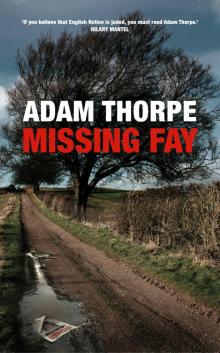 Missing Fay
Missing Fay Hodd
Hodd Pieces of Light
Pieces of Light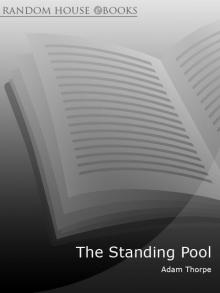 The Standing Pool
The Standing Pool Ulverton
Ulverton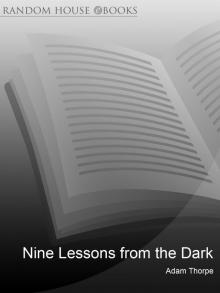 Nine Lessons From the Dark
Nine Lessons From the Dark Flight
Flight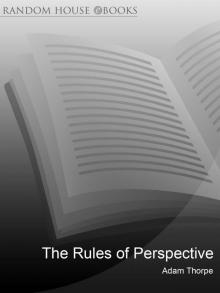 The Rules of Perspective
The Rules of Perspective From the Neanderthal
From the Neanderthal Is This the Way You Said?
Is This the Way You Said?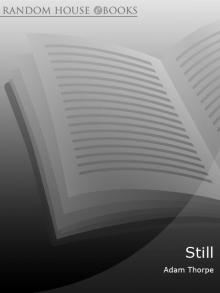 Still
Still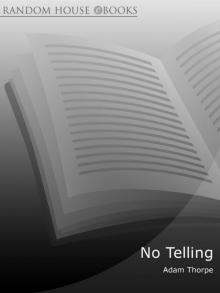 No Telling
No Telling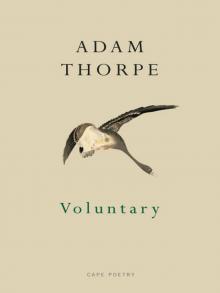 Voluntary
Voluntary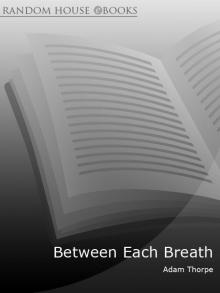 Between Each Breath
Between Each Breath